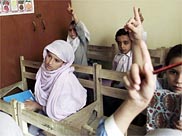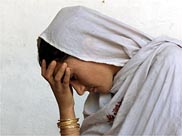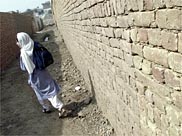October 31, 2001
Escaping Afghanistan, Children Pay Price
By BARRY BEARAK
 |
| ((Ruth Fremson/NYT)) |
| Haziza, a 12-year-old refugee, with much younger classmates in Pakistan. In Afghanistan, she was not allowed to go to school. |
 |
| (Ruth Fremson/The New York Times) |
| Mahtab, 20, no longer has to wear a burka, the heavy shroud that the Taliban require Afghan women to wear. She is happy to be free of it, she said, because looking out through its meshed peephole gave her eyestrain. |
 |
| (Ruth Fremson/The New York Times) |
| When Haziza, 12, arrived at Ariana School in Peshawar, Pakistan, she was placed in a first-grade class with younger children because, back home in Kabul, she and other girls were forbidden to attend school. |
PESHAWAR, Pakistan, Oct. 29 - In the raw gloom, Haziza, 12, helped find her mother and baby brother, dead in the rubble of their collapsed home.
It was early October, the first night of the American bombing of Kabul. The electricity had been cut. Searchers were desperately lighting pieces of paper, one after another, trying to burn away small patches of darkness.
As she spoke, her eyes drifted left and she flinched, as if again in that moment, whether conjured from the stamp of memory or the elastic of imagination. She is a refugee now, having left everything behind but her thoughts.
``She seems unable to concentrate for long,'' said her teacher, a woman named Mullalai. ``Sometimes I look back at her and she is crying. So I go to her. But what is there to say?''
At the Ariana School here in Peshawar, the newly arrived students - the Afghans who have fled the American bombs - are easy to detect. They are anxious. They are mournful. They are withdrawn. And also, they are a head taller than the others in class.
Haziza is such a child. Five years ago, when the Taliban captured Kabul, she was in the first grade. The mullahs' inflexible rendering of Islam forbade girls to attend school. And so Haziza, with her education now hastily revived, is in the first grade still.
After a week, barely a page in her notebook is full. She lags behind her far smaller classmates. They already know the alphabet in Persian. Some know it in English as well.
``I feel very bad because I know less than the others and they are very much younger,'' Haziza said. ``I don't remember the things I was taught five years back.''
Visiting the school, there is an impulse to see a silver lining in Afghanistan's grim situation. For females, the fleeing from home, however sorrowful, comes with a counterweight of liberation. Girls can go back to school, women can again find work. For those who wish it, there is freedom from the mandatory head-to-toe sheathing of the burka.
But the cost of escape has been high, sometimes unbearably so.
As the new children at Ariana tell their stories, rueful themes repeat: the pummeling fury of the air raids, the uncoupling from all that is familiar, the exhausting journey over the mountains, the unremitting neediness of the refugee life.
Haziza's story is sad. ``We lived near the airport and were afraid,'' the girl said. ``My father took me and my brothers to a sturdier house nearby, but my mother said she was not afraid and only if things got dangerous, then she would come.''
Her father, a candy vendor, is a rumpled and sullen man with a tremor in his hands that makes it hard for him to hold a cup of tea. He and Haziza'a older brother independently tell the same details of the bombing and its grim aftermath.
The family now lives in the wretchedness of Tajabad, one of Peshawar's many squatter colonies that teem with Afghan refugees. Haziza sleeps on the dank concrete of their single room, the dampness tempered only by thin bed sheets. Around them is poverty's familiar cavalcade - naked children wallowing in mud, grown men despairing in idleness, chickens foraging in garbage heaps, sewage odors spoiling each breeze.
A relief worker directed Haziza to the Ariana School, where she showed up in the clothes of a ragamuffin and a face that collapsed into grief. She was given a pupil's proper uniform and a seat in one of the rear rows of an overcrowded first-grade classroom.
``She has lost five or six years to the Taliban,'' said Fauzia Habibi, the school's principal. ``Now she cannot concentrate. She and the other refugee children are always thinking about their country, where there is war. They tell us where America is attacking.''
Actually, most of the 2,300 students at the school are refugees, though only 300 are of the post-bombing period. Peshawar, 40 miles from the border, is a city with one million Afghans, an accumulated reservoir of humans from 23 years of crises.
Ariana is a private school where most students pay tuition. The newer refugees, attending free, sit among the others in one of three buildings. Some classes meet outdoors, with canvas as a roof and the grass for chairs. Students squeeze together on benches in the rooms inside. They arrive in shifts, the morning pupils, then the afternoon.
Farishta, 14, fled Kabul during the second week of October. Bombs had flattened houses near her own and terrified her, she said. Her family's escape came over the mountains, and she is still stunned by the abundance in Pakistan, the food and the clothes and the cars. At Ariana, she has been put in the fifth grade, where she left off in 1996.
``I don't know how to solve all the problems,'' Farishta said meekly, tightly tugging on a shawl that covered all but the pale oval of her face. ``I can do the plus and the minus, but the division seems too hard to understand.''
Farishta too lives in Tajabad. It is about an hour's walk from school, through the unfamiliar streets, around a corn field, across enormous ditches gouged into the earth. Her home, like most others in the slum, spills over with people. Her uncle is the main breadwinner, cutting pieces of rubber that are then shaped into cheap sandals.
On a clothesline in the yard hung a burka, now obsolete. Farishta's aunt, Mahtab, 20, had hated to don the Taliban's mandatory womenswear. She suffered eyestrain from looking out its meshed peephole, she said. It made her feel caged. She is glad to be done with it.
But it was the bombing that made her leave Kabul on Oct. 18. Her house was hit during a raid and her mother-in-law was killed by shrapnel, she said. ``It pierced her heart.''
She is angry at America, and when
she is told that the United States is trying to minimize civilian casualties, she answered with a list of neighborhoods where innocents have been killed: Khuja Bughra, Maidan Hawai and others. Her patience wore away quickly at this subject. ``It is easier to understand if it is you being bombed,'' she said.
The years of Taliban rule have not only denied girls an education but boys as well. Their schools may have been open but very little teaching was going on. And when teaching did occur, religion very often replaced reading, writing and arithmetic in the curriculum.
``We would only study the Koran, trying to recite with the right Arabian accent,'' said Murtaza, a 10-year- old boy with gentle dark eyes. He tolerated a short pop quiz, giving the right answer for two plus two but the wrong one for 10 plus 10.
``I don't know this math,'' he said humbly.
Along with the 300 new students have come six new teachers, all women who lost their jobs when the Taliban barred women from work outside their homes. Two of them sat for a while in the school's office, telling of their losses and regrets. They were unforgiving of the Taliban. One teacher said her son had been taken away a year ago for the crime of trimming his beard. Another described being beaten for momentarily showing her face.
But in Peshawar, during these difficult days, the target of the harshest rebukes often flip-flop, going from the Taliban to the Americans and then back again.
Suddenly, a third teacher entered, sitting quietly and beginning to weep.
``I have learned our house in Kabul has been bombed,'' Naheeda Kohistani said, resting her forehead in her palms. ``I don't know if my brother and sister are still alive.''
She attempted to stifle her sobs, then pulsed with anger. ``How could the Americans think this was a military target?'' she asked. ``Or is it the Americans don't even care?''
An awkward silence hung in the room, and then she and the others finally returned to class, to rooms full of children eager to share in the rich knowledge of the world.
Copyright 2001 The New York Times Company
![]()